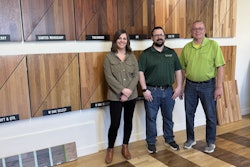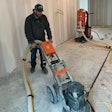When I bought my wood flooring contracting business in 1979, there were only three employees. Today, we have about 16 guys out on job sites, plus our office staff. I'm a real trusting person, but one thing I found is that with that many employees out on different job sites every day, there was a lot of wasted time, which was wasting my company lots of money. Guys would come in on Monday and try to figure out where they'd been the week before for their time sheets. Oddly enough, somehow the hours they couldn't remember always added up to 40. At one point, we figured we were losing about $100,000 a year. If you figure about a half hour of lost time per day per employee, the next thing you know, you're paying for a couple of people's full-time wages for a year.
Over the years, there have been all kinds of incidents I've found out about. I had three guys on a job site, and one guy said, "Mark me down for 4:30. I'm going golfing." One of the other employees told me about it, and the golfer doesn't work for me anymore. Usually the lost time isn't so blatant, though. It's somebody marking down that he got to the job at 7:30, when actually he was just leaving his house. Or he marked that he worked straight through when really he spent a half hour going to get lunch at a burger joint. Another one that cropped up quite a few times was, "By the way, if you need the other room done, I'll do it for 'X' dollars." I'd find out about it when the customer would call me later with a problem—with a wood floor in a room that hadn't been part of our job.
Generally, the people in my office have to show up on time, and when they take breaks, you see them doing it. Floor guys are in an empty house and do what they want. The only way to tell what they're doing is by their production and by dropping in at the site. Of course, you can't be on all the job sites, so we had to come up with a way to keep track of our guys. About eight years ago, we tried using a handheld device that the guys would carry; it had a little box that you would push to clock in and clock out. But the guys would ruin it by pushing a little button on the back that would reset it; then the guys would say that it didn't work.
Next we tried the Nextel phones—the guys were supposed to call in when they arrived and when they left the job, but you didn't know where they were. It was too much of a temptation to call that you were now leaving work for the day when you were already home having a couple of beers.
Now Nextel has a GPS system that pinpoints where each phone is located, and we have Telenav Software for the Nextel phones that turns them into time clocks. There's a button on the phone they must use to clock in and clock out each day. If they don't push the button, they don't get paid, unless something happens like the phone going through the washing machine (which just happened).
Our guys drive their own vehicles, so it wouldn't be legal to put GPS on their personal vans or trucks, but it is legal to track each work phone. We have a 42-inch bigscreen TV in the office that shows where they are on the map or lists where they are with an address. We also get a printout showing where they've been all day. That way you can compare their time sheet to their GPS log, which doesn't take very long. If the bookkeeper sees that they clocked out at 5 p.m. but they left the job site at 4:15 p.m., they have 45 minutes deducted from their pay.
When we first got the GPS, we wanted to see what was happening. We found that pretty much all of the guys were wasting time and money. Even the ones I trusted the most did not keep entirely accurate time sheets. Once we told the guys what we were doing, we had a bunch of grumbling from the older guys who were used to being able to steal time. The older ones would even teach the younger ones, "OK, this is how you do it."
At the same time we started the GPS system, we started buying the guys small trailers advertising our company. We pay them quite a bit of extra money to tow them. We'd always had problems advertising our company on the job sites, because the guys didn't want to put magnetic signs on their own vehicles, and they weren't good about putting out the yard signs. Now the trailers are parked at the job site the whole time we're at the job, and everybody in the neighborhood sees them. Two of the guys didn't want to tow the trailers, as it turns out, because they were doing their own side work. They did not want my company name connected with them when they gave out their own business cards to the neighbors at my job sites. We called one of their home numbers by mistake one day and heard a recorded message about their new hardwood floor company. Who knows how much of my company's equipment, supplies and finish were being used, and how many potential new jobs were being lost, to this new enterprise. They were two of my best floor refinishing guys who had worked for me for years, but I had to terminate them.
With the new trailers and the GPS system, we ended up losing about seven guys between some leaving and some getting fired. They kind of weeded themselves out, and the guys we've got now are a real good group, although we still have to keep an eye on things. We had one incident recently where we saw one of the guys stopping for 45 minutes at an address that was on his route to get to the job. I wondered if the address was an auto parts place, because this employee is really into racing cars. I used GoogleEarth to look it up, and used the satellite pictures to zoom in on the street address on the GPS. Sure enough, it was his car repair shop. I'll have to talk with him later—but at least I know about it now, and we will not be paying for his personal time.
With a floor crew the size of ours, just wasting 15 minutes a day per employee totals about $23,000 per year in lost revenue.
Like most contractors, I'm trying to run a business where people are loyal, and they show up and leave on time. In return, we offer vacation, medical and retirement benefits, which is a great package not offered by many similar companies. Unfortunately, not all employees have the integrity you might hope for. With the help of technology, though, I feel more comfortable that I'm paying my employees for time they actually spent working.
































